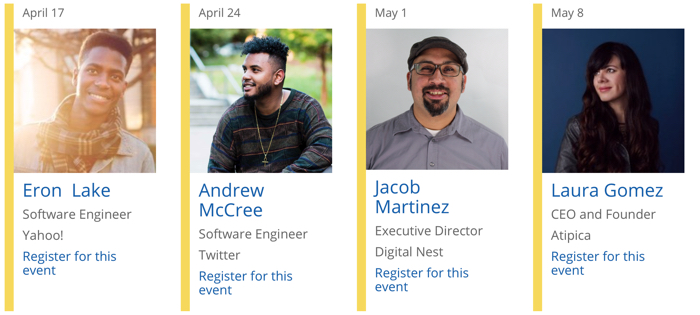As part of a larger effort to get a more diverse population interested in engineering as a field of study and technology as a career, the Baskin School of Engineering is sponsoring “Diverse Voices,” a professional speaker series on Wednesdays that runs through May 8.
The line-up of speakers for Diverse Voices includes:
- Eron Lake, software engineer at Yahoo! (April 17)
- Andrew McCree, software engineer at Twitter (April 24)
- Jacob Martinez, executive director of Digital NEST (May 1)
- Laura Gomez, chief executive officer and founder of Atipica (May 8)
“We wanted different people in the industry who have found success and are advocates for students of color and diverse populations,” said Lindy Boisvert, programs assistant for undergraduate advising in the Baskin School of Engineering.
The events begin with pizza at 4:30 p.m. followed by an interview-style presentation moderated by a Baskin student or alum and a question-and-answer session with students from 5–7 p.m. The talks take place at the Baskin Events Center (Engineering 2, Room 180) and are co-sponsored by UC Santa Cruz’s Office for Diversity, Equity, and Inclusion.
On May 22, there will be speaker panel discussion on “Out in Engineering” organized by the Institute of Electrical and Electronics Engineers. Students who attend get a chance to interact with industry professionals and learn from strong role models in the tech industry.
“At Baskin Engineering, we’re focused on widening the pipeline into engineering programs and the tech industry for women and other groups that are vastly underrepresented in engineering,” said Dean Alexander Wolf. “We are motivated to increase the number of female engineers, engineers of color, LGBTQ engineers in our classrooms and labs—not only to bring the wonderful opportunities that engineering offers to a wider audience, but also because diverse teams do better work: They design better solutions and they understand problems from more diverse perspectives.”
According to Abigail Kaun, special assistant to the dean, initiatives like Diverse Voices can help students from underrepresented groups understand that they belong in engineering and can have an impact on technology.
Of the 4,374 total undergraduate students in engineering majors in fall 2018, 78 percent self-identify as male and 21 percent as female, which corresponds to the national averages (77 percent men, 22.9 percent women) tracked by the American Society for Engineering Education
In terms of race and ethnicity, the largest group of students self-identifies as Asian (36 percent), with the next largest group (26 percent) self-identifying as white. Additionally, 16 percent self-identify as Latinx, which is higher than the national average of 13.7 percent. However only 2 percent self-identify as African American, compared to the national average of 5 percent.
Martinez, who speaks Wednesday, earned undergraduate degrees in ecology and evolutionary biology at UC Santa Cruz and a master’s degree from California State University, Monterey Bay. He created Digital NEST to give opportunities in tech to under-represented young people in Watsonville and Salinas.
“Often, kids from those communities are low-income and don’t have the resources to learn about technology on their own,” he said.
Digital NEST gives youth from high school to age 24 free access to computers, software, wi-fi, and state-of-the-art digital tools and classes.
“The tech industry has been dominated by white men for years,” he said. “The environment they create in the university setting is not welcoming to people of color and women. Things are changing.”
Gomez, the last speaker of the series, received her undergraduate degree at UC Berkeley and her master’s degree at UC San Diego. She founded Atipica, a tech company that helps businesses build truly diverse and inclusive workplaces. The firm’s clients include Eventbrite, Netflix, and the Chan Zuckerberg Initiative. Gomez is also a founding member of Project Include, a nonprofit that works to give everyone a fair chance to succeed in tech. She was named one of the Frederick Douglass 200, a project to honor the impact of 200 living individuals who best embody the work and spirit of Douglass.
McCree, who spoke last week, was born in Los Angeles and recently earned his bachelor of science degree in computer science at UC Santa Cruz. He works on Twitter’s search infrastructure team, which operates the indexes behind the ranked home timeline, recommendations, consumer search and more. McCree states that he “actively works toward understanding failed diversity efforts in tech, while working with industry leaders to ensure that creating a diverse work environment is not only prioritized but executed.”
Eron Lake, a Yahoo! software engineer, gave the first talk in the series April 17. Lake grew up in San Jose and earned a degree in computer science and game design at UC Santa Cruz. He worked as an associate software engineer at Verizon Media/Yahoo Sports and as a gameplay programmer at an independent virtual reality company. He is working on his own virtual reality game.
More information about the series and speakers is available online.



